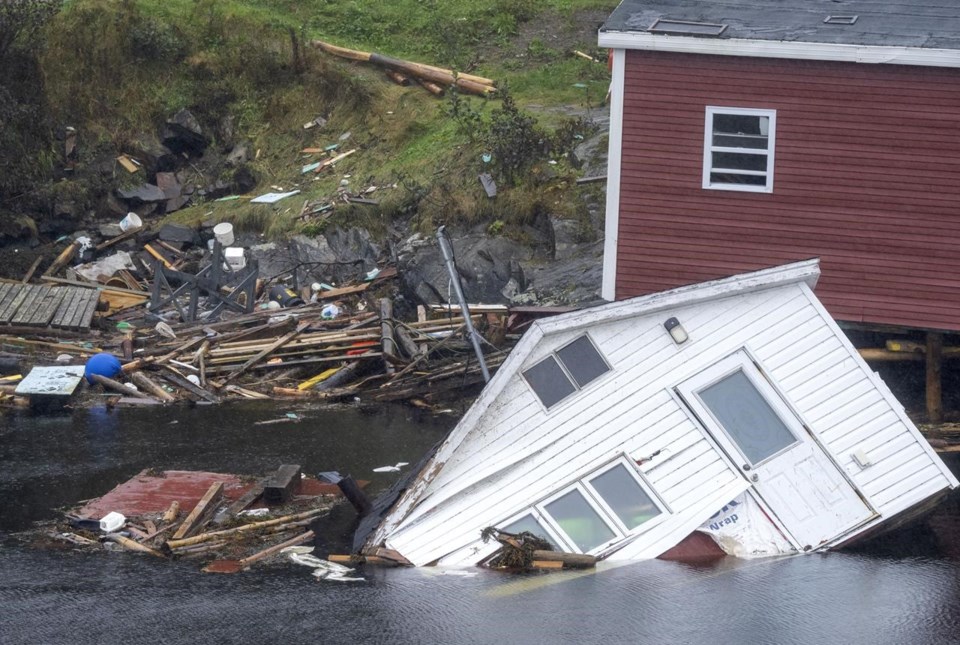OTTAWA — The effects of climate change bit a $20-billion hole out of Canada's economy last year, parliamentary budget officer Yves Giroux said Tuesday.
His office issued a new analysis looking at the economic impacts of climate change over the next 80 years, which comes as the annual United Nations climate conference, also known as COP27, is kicking into high gear in Egypt.
Environment Minister Steven Guilbeault, who is in Sharm El-Sheikh for the two-week gathering, said this meeting is supposed to be the "implementation COP," where promises made around the world to cut greenhouse-gas emissions become more than just talking points.
"We are in the make-or-break decade in our effort to stay below 1.5 degrees Celsius, to keep the planet livable," Guilbeault said in an interview with reporters by phone on Tuesday.
The 2015 Paris climate accord saw every country agree to reduce emissions enough to limit global warming to as close as possible to 1.5 C above pre-industrial times. Over 1.5 C, the effects of climate change begin to mount exponentially. Above 2 C, many are considered irreversible.
Currently, the average global temperature is 1.2 C above pre-industrial levels. A UN report last month said the climate policies in place now would see that grow to 2.8 C by 2100.
If the policies that have been promised but not yet implemented are added, that will come down to 2.4 C to 2.6 C, the UN report said. In Canada those promises would include a cap on emissions from oil and gas production, which is in development now.
Giroux's report concludes that even if all those promises are fully implemented, Canada's GDP is going to grow more slowly than if climate change didn't exist.
And in fact it already did, Giroux said. In 2021, the PBO estimates that the effects of extreme weather caused Canada's GDP to fall to 0.8 per cent lower than what it would have been without climate change.
Tim Scholz, a PBO analyst who co-authored the report, said that works out to roughly between $20 billion and $25 billion less on the reported GDP of $2.5 trillion in 2021.
The economic hits from climate change can include reduced farm outputs from drought or extreme precipitation, lowered productivity for outdoor workers and higher energy bills due to hotter summers.
It can also mean lost work hours when hurricanes, tornadoes and other major storms damage power grids or destroy buildings, and impacts on tourism, such as shorter ski seasons.
In a scenario where all promised climate policies are fully enacted, Canada's GDP is expected to be 0.08 percentage points lower every year than in a world without climate change.
By 2050, that amounts to a GDP reduced by 2.4 per cent compared to no climate change, and by 2100, by 5.8 per cent.
In a scenario where only policies already implemented are in place, the effects of climate change could grow to 2.5 per cent by 2050, and 6.6 per cent by 2100.
Without clear estimates of what Canada's GDP will be in those years, Giroux said quantifying the amount is difficult. But 5.8 per cent of Canada's current economy is about $145 billion and 6.6 per cent is $165 billion.
Giroux is clear that this analysis is the first attempt to quantify the economic impact of climate change and that a variety of factors could influence the final outcome.
That includes how much and how well Canada does to adapt to extreme weather. Investments to strengthen power grids against high winds, make homes and businesses more resilient to floods and fires, irrigate or improve drainage of farm land, and reinforce coastal properties against the growing risk of hurricanes and storm surge could all help keep Canada's economy going even as the weather changes.
Climate change could also bring some positive economic growth, the report notes, such as the possibility of longer growing seasons for farms.
The report doesn't account for the economic impacts of trade disruptions that may be caused as the changing climate affects the economies of some of Canada's big trading partners.
The COP27 meeting in Egypt is wrestling with a lot of that this week, amid dire warnings from UN Secretary-General António Guterres.
"We are in the fight of our lives and we are losing," he said in his opening speech Monday.
Guterres said countries need to make a pact to do everything they can to lower greenhouse gas emissions before 2030, and that rich countries, including Canada, need to step up to help poorer countries transition to renewable energy.
Guilbeault said he hadn't seen the PBO report but he thinks Canadians understand the costs because almost everyone has been directly impacted by climate change themselves, including increasingly strong post-tropical storms like Fiona.
"I don't think we need to convince Canadians that climate is already having an impact in Canada, and that it's costing Canadians billions of dollars," he said. "Go and talk to people in Atlantic Canada right now and it's a very, it's a very quick conversation. They get it."
This report by The Canadian Press was first published Nov. 8, 2022.
Mia Rabson, The Canadian Press




